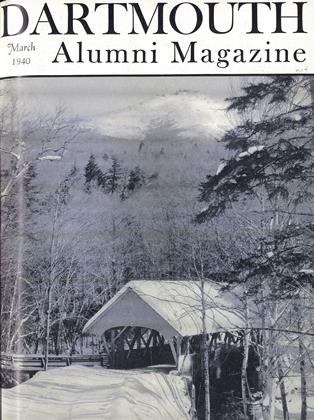THE ANSWER to Mr. Williams' questions lies within the alumni body. For some men actual physical reunions with the College are possible. And for these we recommend a return to visit old friends on the faculty, to browse in the library, and otherwise enjoy a period of re-creation, at times other than football weekends. The current discussion on holding reunions of younger classes during the summer, rather than at the now overcrowded Commencement season, is recognition of a well-founded desire among many men to see the College under favorable circumstances.
But for many others only very infrequent visits at best are possible. "Friends of the Dartmouth Library" has developed from an interest that many alumni have in common—the avocation of book collecting, and the desire to be kept closely in touch with Baker Library. There is talk of recognizing the common ground of alumni who are especially interested in the fine arts. For this group there could be established a close association with an important phase of the College's work. Instances of unorganized participation of alumni, often at long range, in other activities of the College will occur to every reader.
Meanwhile the Hanover Holiday movement has grown in popularity. Its purpose is to bring teachers and alumni together in Hanover. President Hopkins and others have every year taken something of the College to alumni meetings throughout the country. Through this MAGAZINE, through the improved College Film Service, and other publications, something is perhaps done tor the alumni to "enrich their lives." But are these things enough?
The answer will be given by the alumni. They know by now that the College strives to fulfil its function, that this is no private business enterprise being con- ducted in the New Hampshire hills. It is rather an institution largely supported by friends and alumni of the past and present, existing with a definite obligation for the public good, and its immediate public is the alumni body. We are indebted to Mr. Williams for pointing up a question of vital importance. If the College is needed by its sons, as it needs them, what more should and can be done?
 View Full Issue
View Full Issue
More From This Issue
-
 Article
ArticleEducation At Its Best
March 1940 By ARTHUR DEWING '25 -
 Sports
SportsBig Green Teams
March 1940 By Whitey Fuller '37 -
 Article
ArticleAn Obligation to Alumni
March 1940 By BEN AMES WILLIAMS '10 -
 Article
ArticleHanover Browsing
March 1940 By HERBERT F. WEST '22 -
 Class Notes
Class Notes1930*
March 1940 By ALBERT I. DICKERSON -
 Article
ArticleThe College in the Sixties
March 1940 By DR. WILLIAM LELAND HOLT
Article
-
 Article
ArticleSHOULD COLLEGES BE EDUCATIONAL INSTITUTIONS?
MARCH, 1928 -
 Article
ArticleMinsch Reelected Trustee
June 1943 -
 Article
ArticleRuggers on top
June 1987 -
 Article
ArticleTHE DARTMOUTH DAILY
APRIL 1932 By E. H. Hymen '33 -
 Article
ArticleA Hot Summer at Zuk's
October 1950 By F. G. '50 -
 Article
ArticleFOOTBALL REVIEW
JULY 1971 By JACK DEGANGE


